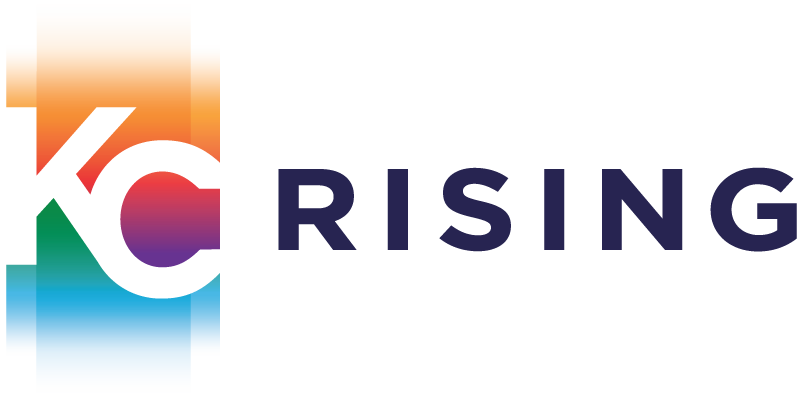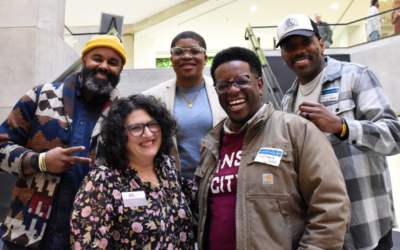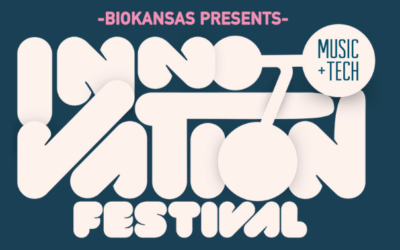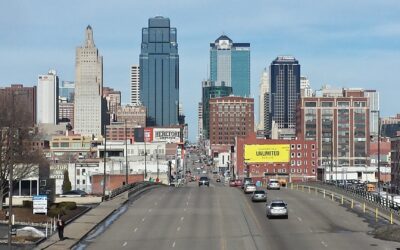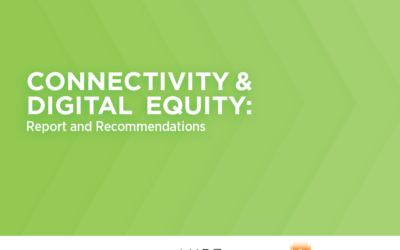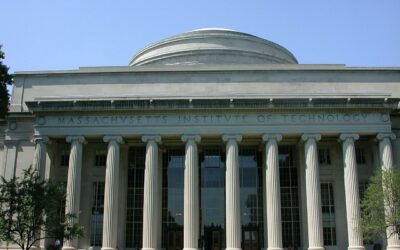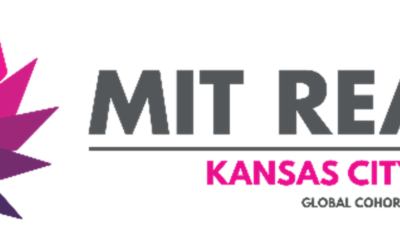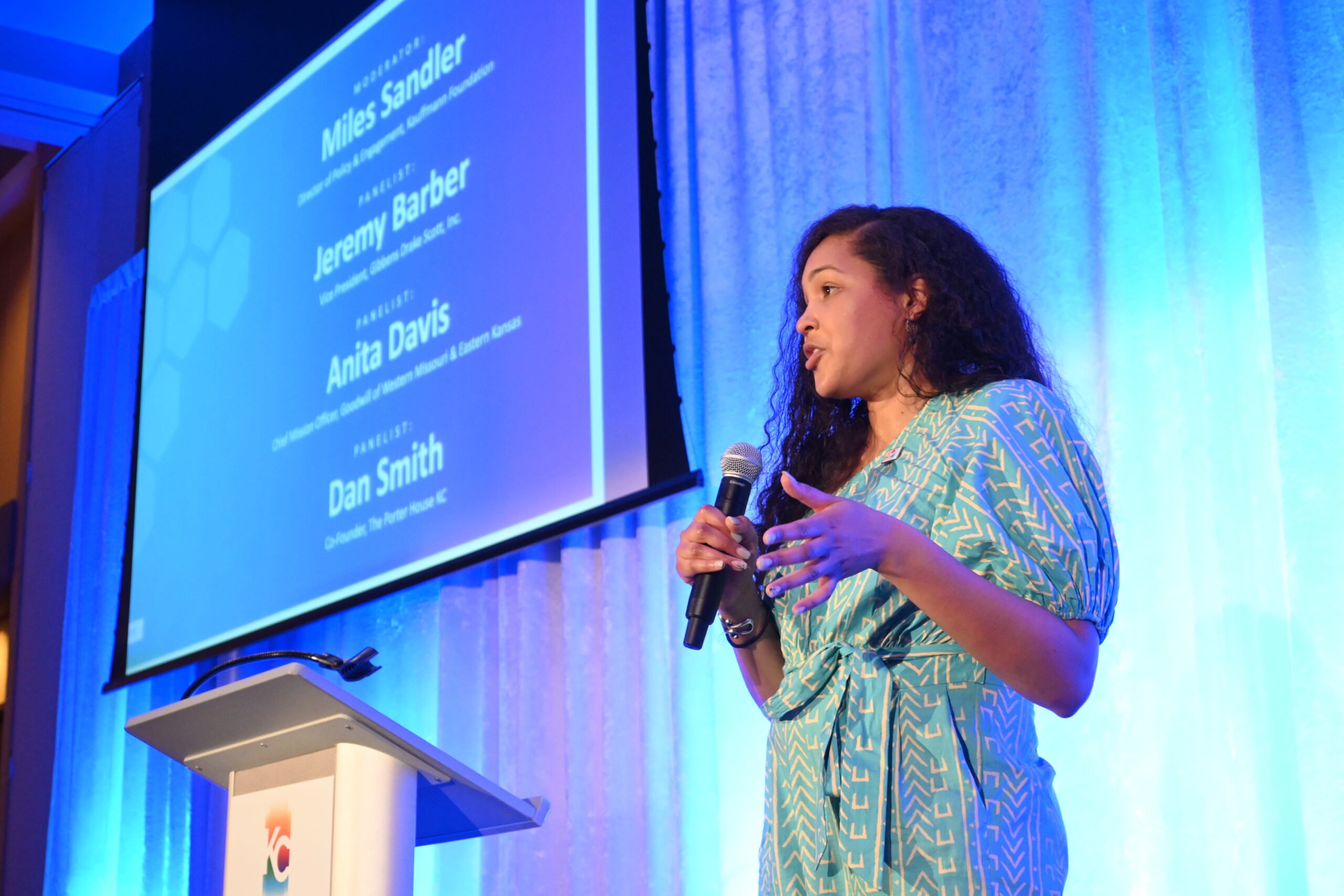Our Purpose
To achieve a shared vision of regional prosperity for all by aligning and accelerating community efforts for greatest impact.

Every aspect of our region contributes its own history, perspective, and energy. The challenges posed by the area’s diverse nature are far outweighed by what it brings in unmatched potential. KC Rising is how KC’s leaders forge pathways of greater collaboration to guide us forward.
When we imagine a greater future for our city, it’s not just for one institution, one industry, or one community. It’s for all.
Enterprise
Learn More +
Industry
Learn More +
Inclusion
Learn More +
Connectivity
Learn More +
Culture
Learn More +
Neighborhoods
Learn More +
Education
Learn More +
Metrics
Framework

Horizon Goals
Growing the Economy, Including Everyone
Compared to benchmark metros


Pillar Metrics
Progress toward the 7 shared vision pillars of prosperity
Comparing our progress over time

Strategy Metrics
Related to community efforts that we are trying to amplify
Monitoring and celebrating success over time
Resources
Growing Access to Capital
One of the effects of the COVID 19 pandemic is the KC Chamber’s Access to Capital initiative. Though improvements were made in the second round of funding, the first round of Paycheck Protection Program funding starkly illustrated the difficulties minority-owned...
Innovation Fest: Celebrating Breakthroughs in Science!
Are you a fan of innovation, science, and technology? Are you looking for an opportunity to immerse yourself in the region's ecosystem and network with top innovators and scientists? Then, don't miss the 2023 Innovation Fest! The festival is a three-day conference...
Hearts Celebrate Art: 2023 Parade of Hearts
Parade of Hearts in Kansas City is a public art experience that celebrates art, culture and diversity by uniting communities while supporting nonprofits. The event features beautifully designed hearts by local artists placed throughout the Kansas City region. The...
Education Resources Pave Way to Inclusive Prosperity
Over 5,310 scholars in the KC Scholars program said they would not have attended college if they did not receive a scholarship. This access to resources and funding for education is vital to Kansas City’s inclusive prosperity because it leads to higher employment...
Project LEAD to Move the Needle on Systemic Racism in the Workplace #2
“What can the business community do?”
That was the question the KC Chamber Board of Directors asked in response to the calls for social justice stemming from the murder of George Floyd in Minneapolis.
The Board’s African American members met and determined five areas of focus: education, employment, access to capital, law enforcement reform, and professional development. Subcommittees were formed for Board members to work on each of those issues.
Project LEAD to Move the Needle on Systemic Racism in the Workplace
“What can the business community do?”
That was the question the KC Chamber Board of Directors asked in response to the calls for social justice stemming from the murder of George Floyd in Minneapolis.
The Board’s African American members met and determined five areas of focus: education, employment, access to capital, law enforcement reform, and professional development. Subcommittees were formed for Board members to work on each of those issues.
Connectivity and Digital Equity Report
Access to the internet has become a fundamental asset that all Kansas City area households require in achieving economic prosperity. A recent study by KC Rising highlighted the increased importance for all households to have a reliable, affordable connection and computer devices for access to education, employment and health. The COVID-19 pandemic made this need more urgent, with over 100,000 area households currently without broadband subscriptions and computer devices to enable these meaningful uses. While many neighborhoods and communities show high numbers of households with internet subscriptions and devices, many urban core neighborhoods, small outlying communities, and rural areas lack such access.
Kansas City’s Future Global Biologics Hub to be Built on a Foundation of Cooperation
“No one is in charge of entrepreneurship.” – this quote, attributed to Professor Scott Stern in a May 16th blog, became the motto for faculty facilitating the MIT REAP Cohort 9. With no single party in charge, the government, existing corporations, entrepreneurs, venture capital and universities have a vital role. They cooperated, supported each other, and were willing to let everyone (and no one) be in charge.
Kansas City To Create Global Biologics Hub As Part Of Acceptance To Prestigious MIT Entrepreneurship Acceleration Program
(Kansas City, MO – May 16, 2022) – Building on prior life science success in human and animal health, Kansas City is creating the most inclusive biologics hub for the development, production and distribution of biologics as part of its acceptance to the MIT Regional Entrepreneurship Acceleration Program (MIT REAP). Kansas City was selected as part of the Heartland Civic Collaborative, working with Des Moines, Omaha, and St. Louis to be a global life science destination.
Together we are Making a Shared Vision Reality
Led by the Downtown Council (DTC), business, civic, and neighborhood leaders joined together over the last two years to imagine the future of greater Downtown Kansas City. With the guidance of the steering committee chair, Warren Erdman, Kansas City Southern, the planning process attracted both long-time stakeholders and emerging voices across greater Downtown to work together.
In short, our goal is to grow the economy for everyone.
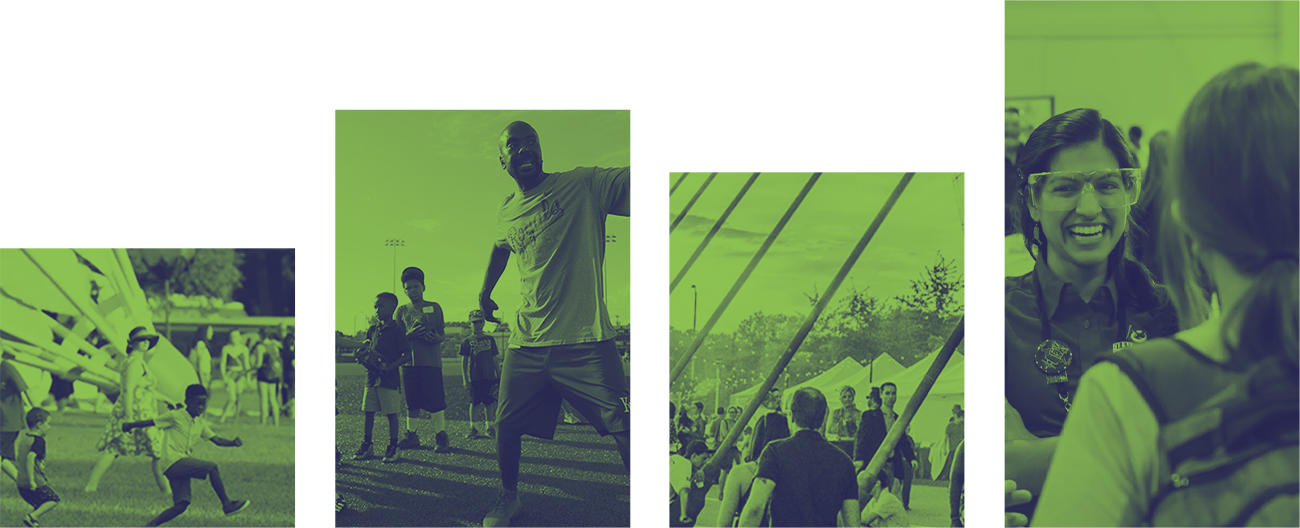
Images provided by Ewing Marion Kauffman Foundation
Questions for KC Rising
Do you have any questions KC Rising related? Please contact us for more information.
Want to get involved?
Join our newsletter
Enterprise
A robust entrepreneurial ecosystem sparks scalable business and leads to breakthroughs that can transform our economy.
Salaries at KC’s new entrepreneurial firms surpass the area’s average in less than two years, demonstrating that startup culture enables true upward mobility. For cities in America’s Heartland, the level of employment at companies five years old or less is a core indicator of economic vitality: the higher the share, the greater the potential for future growth.
Growth is also created when private companies team up with universities, nonprofits, and individuals to transform research into revenue in the marketplace. Established businesses that encourage and invest in intrapreneurship, research and development, and idea exchange also expand our possibilities.
When companies of all sizes embrace a culture of working together, have an array of capital options, remove barriers to technology transfer, and are connected with relevant networks and resources, they generate scale, create new markets, and produce quality jobs. This ecosystem of economic stewardship lays the groundwork for the next generation of business, with exponential rewards in the immediate future and beyond.
Industry
Building on our strengths enables our region to attract, grow, and retain globally competitive businesses.
Shaping our region’s economic identity in the decades to come means boosting our current sectors of excellence to encourage outside investment, internal expansion, and innovative entrepreneurship to reinforce larger industries. Successful specialization relies on recognizing and nurturing those areas of differentiation in which KC leads and can advance, then unabashedly leveraging those strengths to amplify Kansas City’s profile worldwide.
At the same time, our community must purposefully identify and invest in emerging fields that will shape the broader economy in the years ahead. This will help KC remain relevant and robust even amid rapid technological and societal change. Significant exploration occurs in our academic and research institutions, but can only have meaningful impact if boosted and accompanied by commercialization strategies. Linking research activity with critical public and private funding today will lead to transformative discoveries tomorrow.
Intentional and cohesive regional strategies to develop clusters are vital to effectively demonstrate expertise and produce results. As we do so, we will recruit workers and other businesses driven by options and opportunity, further strengthening a virtuous cycle.
Inclusion
Economies thrive through increased participation when everyone has equitable opportunities to advance.
Economic inclusion is not just the right thing to do: Growing economies rely on broader-based opportunity that proactively recruits and elevates women and people of color. Resilient industries require a commitment to inclusion across the primary and secondary dimensions of diversity and their intersectionality. Dynamic firms draw upon the largest possible local community of talent, which simultaneously cultivates a welcoming reputation that appeals to workers of every demographic.
For decades, the gap between lower- and higher-income households has steadily widened ¬– a trend KC must reverse to achieve wider prosperity for those at every level. Increased participation creates achievable paths toward building stable wealth to sustain individuals and neighborhoods. True inclusion means investing in potential everywhere it lives – in every classroom, every ZIP code, and every business plan.
As we lay the foundation of a more inclusive community, we are called upon to face and overcome our troubling past, and confront the discriminatory policies and systemic practices that have shaped the institutional obstacles to equality still affecting KC. Achieving measurable, equitable economic mobility requires listening and leading by example, aligning public policy with tangible personal change, being transparent and accountable, and making space at the table for historically marginalized voices at every step.
Connectivity
Effective, accessible transportation and internet options open doors to economic mobility.
Of the million jobs in the KC metro area, only about half are located within a quarter-mile of a transit stop. Sprawling urban footprints, fragmented public funding, and a lack of widespread connectivity serve as barriers to a city’s advancement. But KC has the chance to harness current momentum toward true regional access, based on integrated transit and broadband solutions that reach across state, county, and district borders.
The time has come to bridge the digital divide. The explosion in remote working, training, and learning has made reliable, affordable high-speed networks even more essential, on a level with other public utilities. The need for universal access, skills, and equipment holds true across the region – from rural areas to urban, from startups to schoolchildren.
As KC grows, creative thinking can help us avoid further congestion, environmental harm, and the geographical isolation that can splinter a region.
Thoughtful land use policies must be put into practice, alongside investment in more seamless, multimodal transit options and authentic collaboration between industry, individuals, government, and civic institutions. This is how we will ultimately connect earners with jobs, learners with educators, neighborhoods with amenities – through pathways both efficient and equitable.
Culture
Cultural assets are an integral component of our economy, as well as a force to unify and inspire our region.
The collective arts and entertainment industry is our third-largest employer, contributing hundreds of millions in household income annually. It’s a leading factor driving our multibillion-dollar tourism draw.
KC’s burgeoning arts districts and concentration of quality creative jobs are also attractors that feed into one of our greatest assets: our pool of talent. In addition, Kansas City has a proud history of demonstrating how partnerships between a city’s entrepreneurs and creative professionals can spawn yet another level of innovation.
Our exceptional character encompasses more than just a deep and distinct heritage in music, arts, architecture, and food. In addition to the jobs, revenue, and pride generated by our sports teams, winning has translated to greater national visibility. It’s all part of a one-of-a-kind narrative that defines our quality of life and makes us who we are.
Neighborhoods
Healthy, safe, and attainable housing options allow people to build better futures.
The variety, livability, and affordability of KC’s housing market have long served as a leading factor for firms moving jobs to the region. Central districts, rural towns, and suburbs near and far already make us an attractive option for both young workers and growing families – as well as their employers.
As our city grows, it must stay within reach for the people we will need to fuel our aspirations and our culture, regardless of their income level. KC’s neighborhoods need dedicated strategies that provide a true range of quality choices for our residents to live, work, and play. This means collaborative, intentional planning and follow-through for infrastructure and schools, transit and walkability, safety and health initiatives, and amenities and essential resources that all provide a solid foundation for communities to prosper.
We have an opportunity to focus on long-term sustainability as we create and revive the distinctive areas in our city to meet evolving needs. Success also includes maintaining a culture of shared history and viability for both new and established residents of every background and generation. A brighter economic future can best come to life with stable, safe, and inclusive places for everyone to call home.
Education
Learners of all ages need equitable access to continuous, innovative, quality education to meet evolving workforce needs.
Because the rate of technological advancement and change in our global economy continues to increase, more than half of today’s schoolchildren will soon have careers in occupations that don’t currently exist. Meanwhile, businesses struggle to find the talented workers they need to fill high-quality jobs now and create more in the future.
To effectively address this gap, talent and potential must be recognized, maximized, and met with resources and attention across the learning continuum. A foundation of technical knowledge, along with critical thinking and communication skills, allows learners of all ages to remain competitive. Building an agile culture of enduring, well-rounded education will keep involved citizens inventing, creating, and thriving.
Industry-led cooperation, alongside flexible credentialing, creates trailblazing regional talent-to-work pipelines by connecting classroom and real-world learning with hiring. This system should strive to remain nimble and responsive as our economy evolves. KC is proudly at the forefront of this movement, with engaged stakeholders focused on measurable outcomes. We must continue to reimagine, disrupt, and transform.
Industry
Building on our strengths enables our region to attract, grow, and retain globally competitive businesses.
Shaping our region’s economic identity in the decades to come means boosting our current sectors of excellence to encourage outside investment, internal expansion, and innovative entrepreneurship to reinforce larger industries. Successful specialization relies on recognizing and nurturing those areas of differentiation in which KC leads and can advance, then unabashedly leveraging those strengths to amplify Kansas City’s profile worldwide.
At the same time, our community must purposefully identify and invest in emerging fields that will shape the broader economy in the years ahead. This will help KC remain relevant and robust even amid rapid technological and societal change. Significant exploration occurs in our academic and research institutions, but can only have meaningful impact if boosted and accompanied by commercialization strategies. Linking research activity with critical public and private funding today will lead to transformative discoveries tomorrow.
Intentional and cohesive regional strategies to develop clusters are vital to effectively demonstrate expertise and produce results. As we do so, we will recruit workers and other businesses driven by options and opportunity, further strengthening a virtuous cycle.
Inclusion
Economies thrive through increased participation when everyone has equitable opportunities to advance.
Economic inclusion is not just the right thing to do: Growing economies rely on broader-based opportunity that proactively recruits and elevates women and people of color. Resilient industries require a commitment to inclusion across the primary and secondary dimensions of diversity and their intersectionality. Dynamic firms draw upon the largest possible local community of talent, which simultaneously cultivates a welcoming reputation that appeals to workers of every demographic.
For decades, the gap between lower- and higher-income households has steadily widened ¬– a trend KC must reverse to achieve wider prosperity for those at every level. Increased participation creates achievable paths toward building stable wealth to sustain individuals and neighborhoods. True inclusion means investing in potential everywhere it lives – in every classroom, every ZIP code, and every business plan.
As we lay the foundation of a more inclusive community, we are called upon to face and overcome our troubling past, and confront the discriminatory policies and systemic practices that have shaped the institutional obstacles to equality still affecting KC. Achieving measurable, equitable economic mobility requires listening and leading by example, aligning public policy with tangible personal change, being transparent and accountable, and making space at the table for historically marginalized voices at every step.
Connectivity
Effective, accessible transportation and internet options open doors to economic mobility.
Of the million jobs in the KC metro area, only about half are located within a quarter-mile of a transit stop. Sprawling urban footprints, fragmented public funding, and a lack of widespread connectivity serve as barriers to a city’s advancement. But KC has the chance to harness current momentum toward true regional access, based on integrated transit and broadband solutions that reach across state, county, and district borders.
The time has come to bridge the digital divide. The explosion in remote working, training, and learning has made reliable, affordable high-speed networks even more essential, on a level with other public utilities. The need for universal access, skills, and equipment holds true across the region – from rural areas to urban, from startups to schoolchildren.
As KC grows, creative thinking can help us avoid further congestion, environmental harm, and the geographical isolation that can splinter a region.
Thoughtful land use policies must be put into practice, alongside investment in more seamless, multimodal transit options and authentic collaboration between industry, individuals, government, and civic institutions. This is how we will ultimately connect earners with jobs, learners with educators, neighborhoods with amenities – through pathways both efficient and equitable.
Culture
Cultural assets are an integral component of our economy, as well as a force to unify and inspire our region.
The collective arts and entertainment industry is our third-largest employer, contributing hundreds of millions in household income annually. It’s a leading factor driving our multibillion-dollar tourism draw.
KC’s burgeoning arts districts and concentration of quality creative jobs are also attractors that feed into one of our greatest assets: our pool of talent. In addition, Kansas City has a proud history of demonstrating how partnerships between a city’s entrepreneurs and creative professionals can spawn yet another level of innovation.
Our exceptional character encompasses more than just a deep and distinct heritage in music, arts, architecture, and food. In addition to the jobs, revenue, and pride generated by our sports teams, winning has translated to greater national visibility. It’s all part of a one-of-a-kind narrative that defines our quality of life and makes us who we are.
Neighborhoods
Healthy, safe, and attainable housing options allow people to build better futures.
The variety, livability, and affordability of KC’s housing market have long served as a leading factor for firms moving jobs to the region. Central districts, rural towns, and suburbs near and far already make us an attractive option for both young workers and growing families – as well as their employers.
As our city grows, it must stay within reach for the people we will need to fuel our aspirations and our culture, regardless of their income level. KC’s neighborhoods need dedicated strategies that provide a true range of quality choices for our residents to live, work, and play. This means collaborative, intentional planning and follow-through for infrastructure and schools, transit and walkability, safety and health initiatives, and amenities and essential resources that all provide a solid foundation for communities to prosper.
We have an opportunity to focus on long-term sustainability as we create and revive the distinctive areas in our city to meet evolving needs. Success also includes maintaining a culture of shared history and viability for both new and established residents of every background and generation. A brighter economic future can best come to life with stable, safe, and inclusive places for everyone to call home.
Education
Learners of all ages need equitable access to continuous, innovative, quality education to meet evolving workforce needs.
Because the rate of technological advancement and change in our global economy continues to increase, more than half of today’s schoolchildren will soon have careers in occupations that don’t currently exist. Meanwhile, businesses struggle to find the talented workers they need to fill high-quality jobs now and create more in the future.
To effectively address this gap, talent and potential must be recognized, maximized, and met with resources and attention across the learning continuum. A foundation of technical knowledge, along with critical thinking and communication skills, allows learners of all ages to remain competitive. Building an agile culture of enduring, well-rounded education will keep involved citizens inventing, creating, and thriving.
Industry-led cooperation, alongside flexible credentialing, creates trailblazing regional talent-to-work pipelines by connecting classroom and real-world learning with hiring. This system should strive to remain nimble and responsive as our economy evolves. KC is proudly at the forefront of this movement, with engaged stakeholders focused on measurable outcomes. We must continue to reimagine, disrupt, and transform.
Enterprise
A robust entrepreneurial ecosystem sparks scalable business and leads to breakthroughs that can transform our economy.
Salaries at KC’s new entrepreneurial firms surpass the area’s average in less than two years, demonstrating that startup culture enables true upward mobility. For cities in America’s Heartland, the level of employment at companies five years old or less is a core indicator of economic vitality: the higher the share, the greater the potential for future growth.
Growth is also created when private companies team up with universities, nonprofits, and individuals to transform research into revenue in the marketplace. Established businesses that encourage and invest in intrapreneurship, research and development, and idea exchange also expand our possibilities.
When companies of all sizes embrace a culture of working together, have an array of capital options, remove barriers to technology transfer, and are connected with relevant networks and resources, they generate scale, create new markets, and produce quality jobs. This ecosystem of economic stewardship lays the groundwork for the next generation of business, with exponential rewards in the immediate future and beyond.
Inclusion
Economies thrive through increased participation when everyone has equitable opportunities to advance.
Economic inclusion is not just the right thing to do: Growing economies rely on broader-based opportunity that proactively recruits and elevates women and people of color. Resilient industries require a commitment to inclusion across the primary and secondary dimensions of diversity and their intersectionality. Dynamic firms draw upon the largest possible local community of talent, which simultaneously cultivates a welcoming reputation that appeals to workers of every demographic.
For decades, the gap between lower- and higher-income households has steadily widened ¬– a trend KC must reverse to achieve wider prosperity for those at every level. Increased participation creates achievable paths toward building stable wealth to sustain individuals and neighborhoods. True inclusion means investing in potential everywhere it lives – in every classroom, every ZIP code, and every business plan.
As we lay the foundation of a more inclusive community, we are called upon to face and overcome our troubling past, and confront the discriminatory policies and systemic practices that have shaped the institutional obstacles to equality still affecting KC. Achieving measurable, equitable economic mobility requires listening and leading by example, aligning public policy with tangible personal change, being transparent and accountable, and making space at the table for historically marginalized voices at every step.
Connectivity
Effective, accessible transportation and internet options open doors to economic mobility.
Of the million jobs in the KC metro area, only about half are located within a quarter-mile of a transit stop. Sprawling urban footprints, fragmented public funding, and a lack of widespread connectivity serve as barriers to a city’s advancement. But KC has the chance to harness current momentum toward true regional access, based on integrated transit and broadband solutions that reach across state, county, and district borders.
The time has come to bridge the digital divide. The explosion in remote working, training, and learning has made reliable, affordable high-speed networks even more essential, on a level with other public utilities. The need for universal access, skills, and equipment holds true across the region – from rural areas to urban, from startups to schoolchildren.
As KC grows, creative thinking can help us avoid further congestion, environmental harm, and the geographical isolation that can splinter a region.
Thoughtful land use policies must be put into practice, alongside investment in more seamless, multimodal transit options and authentic collaboration between industry, individuals, government, and civic institutions. This is how we will ultimately connect earners with jobs, learners with educators, neighborhoods with amenities – through pathways both efficient and equitable.
Culture
Cultural assets are an integral component of our economy, as well as a force to unify and inspire our region.
The collective arts and entertainment industry is our third-largest employer, contributing hundreds of millions in household income annually. It’s a leading factor driving our multibillion-dollar tourism draw.
KC’s burgeoning arts districts and concentration of quality creative jobs are also attractors that feed into one of our greatest assets: our pool of talent. In addition, Kansas City has a proud history of demonstrating how partnerships between a city’s entrepreneurs and creative professionals can spawn yet another level of innovation.
Our exceptional character encompasses more than just a deep and distinct heritage in music, arts, architecture, and food. In addition to the jobs, revenue, and pride generated by our sports teams, winning has translated to greater national visibility. It’s all part of a one-of-a-kind narrative that defines our quality of life and makes us who we are.
Neighborhoods
Healthy, safe, and attainable housing options allow people to build better futures.
The variety, livability, and affordability of KC’s housing market have long served as a leading factor for firms moving jobs to the region. Central districts, rural towns, and suburbs near and far already make us an attractive option for both young workers and growing families – as well as their employers.
As our city grows, it must stay within reach for the people we will need to fuel our aspirations and our culture, regardless of their income level. KC’s neighborhoods need dedicated strategies that provide a true range of quality choices for our residents to live, work, and play. This means collaborative, intentional planning and follow-through for infrastructure and schools, transit and walkability, safety and health initiatives, and amenities and essential resources that all provide a solid foundation for communities to prosper.
We have an opportunity to focus on long-term sustainability as we create and revive the distinctive areas in our city to meet evolving needs. Success also includes maintaining a culture of shared history and viability for both new and established residents of every background and generation. A brighter economic future can best come to life with stable, safe, and inclusive places for everyone to call home.
Education
Learners of all ages need equitable access to continuous, innovative, quality education to meet evolving workforce needs.
Because the rate of technological advancement and change in our global economy continues to increase, more than half of today’s schoolchildren will soon have careers in occupations that don’t currently exist. Meanwhile, businesses struggle to find the talented workers they need to fill high-quality jobs now and create more in the future.
To effectively address this gap, talent and potential must be recognized, maximized, and met with resources and attention across the learning continuum. A foundation of technical knowledge, along with critical thinking and communication skills, allows learners of all ages to remain competitive. Building an agile culture of enduring, well-rounded education will keep involved citizens inventing, creating, and thriving.
Industry-led cooperation, alongside flexible credentialing, creates trailblazing regional talent-to-work pipelines by connecting classroom and real-world learning with hiring. This system should strive to remain nimble and responsive as our economy evolves. KC is proudly at the forefront of this movement, with engaged stakeholders focused on measurable outcomes. We must continue to reimagine, disrupt, and transform.
Enterprise
A robust entrepreneurial ecosystem sparks scalable business and leads to breakthroughs that can transform our economy.
Salaries at KC’s new entrepreneurial firms surpass the area’s average in less than two years, demonstrating that startup culture enables true upward mobility. For cities in America’s Heartland, the level of employment at companies five years old or less is a core indicator of economic vitality: the higher the share, the greater the potential for future growth.
Growth is also created when private companies team up with universities, nonprofits, and individuals to transform research into revenue in the marketplace. Established businesses that encourage and invest in intrapreneurship, research and development, and idea exchange also expand our possibilities.
When companies of all sizes embrace a culture of working together, have an array of capital options, remove barriers to technology transfer, and are connected with relevant networks and resources, they generate scale, create new markets, and produce quality jobs. This ecosystem of economic stewardship lays the groundwork for the next generation of business, with exponential rewards in the immediate future and beyond.
Industry
Building on our strengths enables our region to attract, grow, and retain globally competitive businesses.
Shaping our region’s economic identity in the decades to come means boosting our current sectors of excellence to encourage outside investment, internal expansion, and innovative entrepreneurship to reinforce larger industries. Successful specialization relies on recognizing and nurturing those areas of differentiation in which KC leads and can advance, then unabashedly leveraging those strengths to amplify Kansas City’s profile worldwide.
At the same time, our community must purposefully identify and invest in emerging fields that will shape the broader economy in the years ahead. This will help KC remain relevant and robust even amid rapid technological and societal change. Significant exploration occurs in our academic and research institutions, but can only have meaningful impact if boosted and accompanied by commercialization strategies. Linking research activity with critical public and private funding today will lead to transformative discoveries tomorrow.
Intentional and cohesive regional strategies to develop clusters are vital to effectively demonstrate expertise and produce results. As we do so, we will recruit workers and other businesses driven by options and opportunity, further strengthening a virtuous cycle.
Connectivity
Effective, accessible transportation and internet options open doors to economic mobility.
Of the million jobs in the KC metro area, only about half are located within a quarter-mile of a transit stop. Sprawling urban footprints, fragmented public funding, and a lack of widespread connectivity serve as barriers to a city’s advancement. But KC has the chance to harness current momentum toward true regional access, based on integrated transit and broadband solutions that reach across state, county, and district borders.
The time has come to bridge the digital divide. The explosion in remote working, training, and learning has made reliable, affordable high-speed networks even more essential, on a level with other public utilities. The need for universal access, skills, and equipment holds true across the region – from rural areas to urban, from startups to schoolchildren.
As KC grows, creative thinking can help us avoid further congestion, environmental harm, and the geographical isolation that can splinter a region.
Thoughtful land use policies must be put into practice, alongside investment in more seamless, multimodal transit options and authentic collaboration between industry, individuals, government, and civic institutions. This is how we will ultimately connect earners with jobs, learners with educators, neighborhoods with amenities – through pathways both efficient and equitable.
Culture
Cultural assets are an integral component of our economy, as well as a force to unify and inspire our region.
The collective arts and entertainment industry is our third-largest employer, contributing hundreds of millions in household income annually. It’s a leading factor driving our multibillion-dollar tourism draw.
KC’s burgeoning arts districts and concentration of quality creative jobs are also attractors that feed into one of our greatest assets: our pool of talent. In addition, Kansas City has a proud history of demonstrating how partnerships between a city’s entrepreneurs and creative professionals can spawn yet another level of innovation.
Our exceptional character encompasses more than just a deep and distinct heritage in music, arts, architecture, and food. In addition to the jobs, revenue, and pride generated by our sports teams, winning has translated to greater national visibility. It’s all part of a one-of-a-kind narrative that defines our quality of life and makes us who we are.
Neighborhoods
Healthy, safe, and attainable housing options allow people to build better futures.
The variety, livability, and affordability of KC’s housing market have long served as a leading factor for firms moving jobs to the region. Central districts, rural towns, and suburbs near and far already make us an attractive option for both young workers and growing families – as well as their employers.
As our city grows, it must stay within reach for the people we will need to fuel our aspirations and our culture, regardless of their income level. KC’s neighborhoods need dedicated strategies that provide a true range of quality choices for our residents to live, work, and play. This means collaborative, intentional planning and follow-through for infrastructure and schools, transit and walkability, safety and health initiatives, and amenities and essential resources that all provide a solid foundation for communities to prosper.
We have an opportunity to focus on long-term sustainability as we create and revive the distinctive areas in our city to meet evolving needs. Success also includes maintaining a culture of shared history and viability for both new and established residents of every background and generation. A brighter economic future can best come to life with stable, safe, and inclusive places for everyone to call home.
Education
Learners of all ages need equitable access to continuous, innovative, quality education to meet evolving workforce needs.
Because the rate of technological advancement and change in our global economy continues to increase, more than half of today’s schoolchildren will soon have careers in occupations that don’t currently exist. Meanwhile, businesses struggle to find the talented workers they need to fill high-quality jobs now and create more in the future.
To effectively address this gap, talent and potential must be recognized, maximized, and met with resources and attention across the learning continuum. A foundation of technical knowledge, along with critical thinking and communication skills, allows learners of all ages to remain competitive. Building an agile culture of enduring, well-rounded education will keep involved citizens inventing, creating, and thriving.
Industry-led cooperation, alongside flexible credentialing, creates trailblazing regional talent-to-work pipelines by connecting classroom and real-world learning with hiring. This system should strive to remain nimble and responsive as our economy evolves. KC is proudly at the forefront of this movement, with engaged stakeholders focused on measurable outcomes. We must continue to reimagine, disrupt, and transform.
Enterprise
A robust entrepreneurial ecosystem sparks scalable business and leads to breakthroughs that can transform our economy.
Salaries at KC’s new entrepreneurial firms surpass the area’s average in less than two years, demonstrating that startup culture enables true upward mobility. For cities in America’s Heartland, the level of employment at companies five years old or less is a core indicator of economic vitality: the higher the share, the greater the potential for future growth.
Growth is also created when private companies team up with universities, nonprofits, and individuals to transform research into revenue in the marketplace. Established businesses that encourage and invest in intrapreneurship, research and development, and idea exchange also expand our possibilities.
When companies of all sizes embrace a culture of working together, have an array of capital options, remove barriers to technology transfer, and are connected with relevant networks and resources, they generate scale, create new markets, and produce quality jobs. This ecosystem of economic stewardship lays the groundwork for the next generation of business, with exponential rewards in the immediate future and beyond.
Industry
Building on our strengths enables our region to attract, grow, and retain globally competitive businesses.
Shaping our region’s economic identity in the decades to come means boosting our current sectors of excellence to encourage outside investment, internal expansion, and innovative entrepreneurship to reinforce larger industries. Successful specialization relies on recognizing and nurturing those areas of differentiation in which KC leads and can advance, then unabashedly leveraging those strengths to amplify Kansas City’s profile worldwide.
At the same time, our community must purposefully identify and invest in emerging fields that will shape the broader economy in the years ahead. This will help KC remain relevant and robust even amid rapid technological and societal change. Significant exploration occurs in our academic and research institutions, but can only have meaningful impact if boosted and accompanied by commercialization strategies. Linking research activity with critical public and private funding today will lead to transformative discoveries tomorrow.
Intentional and cohesive regional strategies to develop clusters are vital to effectively demonstrate expertise and produce results. As we do so, we will recruit workers and other businesses driven by options and opportunity, further strengthening a virtuous cycle.
Inclusion
Economies thrive through increased participation when everyone has equitable opportunities to advance.
Economic inclusion is not just the right thing to do: Growing economies rely on broader-based opportunity that proactively recruits and elevates women and people of color. Resilient industries require a commitment to inclusion across the primary and secondary dimensions of diversity and their intersectionality. Dynamic firms draw upon the largest possible local community of talent, which simultaneously cultivates a welcoming reputation that appeals to workers of every demographic.
For decades, the gap between lower- and higher-income households has steadily widened ¬– a trend KC must reverse to achieve wider prosperity for those at every level. Increased participation creates achievable paths toward building stable wealth to sustain individuals and neighborhoods. True inclusion means investing in potential everywhere it lives – in every classroom, every ZIP code, and every business plan.
As we lay the foundation of a more inclusive community, we are called upon to face and overcome our troubling past, and confront the discriminatory policies and systemic practices that have shaped the institutional obstacles to equality still affecting KC. Achieving measurable, equitable economic mobility requires listening and leading by example, aligning public policy with tangible personal change, being transparent and accountable, and making space at the table for historically marginalized voices at every step.
Culture
Cultural assets are an integral component of our economy, as well as a force to unify and inspire our region.
The collective arts and entertainment industry is our third-largest employer, contributing hundreds of millions in household income annually. It’s a leading factor driving our multibillion-dollar tourism draw.
KC’s burgeoning arts districts and concentration of quality creative jobs are also attractors that feed into one of our greatest assets: our pool of talent. In addition, Kansas City has a proud history of demonstrating how partnerships between a city’s entrepreneurs and creative professionals can spawn yet another level of innovation.
Our exceptional character encompasses more than just a deep and distinct heritage in music, arts, architecture, and food. In addition to the jobs, revenue, and pride generated by our sports teams, winning has translated to greater national visibility. It’s all part of a one-of-a-kind narrative that defines our quality of life and makes us who we are.
Neighborhoods
Healthy, safe, and attainable housing options allow people to build better futures.
The variety, livability, and affordability of KC’s housing market have long served as a leading factor for firms moving jobs to the region. Central districts, rural towns, and suburbs near and far already make us an attractive option for both young workers and growing families – as well as their employers.
As our city grows, it must stay within reach for the people we will need to fuel our aspirations and our culture, regardless of their income level. KC’s neighborhoods need dedicated strategies that provide a true range of quality choices for our residents to live, work, and play. This means collaborative, intentional planning and follow-through for infrastructure and schools, transit and walkability, safety and health initiatives, and amenities and essential resources that all provide a solid foundation for communities to prosper.
We have an opportunity to focus on long-term sustainability as we create and revive the distinctive areas in our city to meet evolving needs. Success also includes maintaining a culture of shared history and viability for both new and established residents of every background and generation. A brighter economic future can best come to life with stable, safe, and inclusive places for everyone to call home.
Education
Learners of all ages need equitable access to continuous, innovative, quality education to meet evolving workforce needs.
Because the rate of technological advancement and change in our global economy continues to increase, more than half of today’s schoolchildren will soon have careers in occupations that don’t currently exist. Meanwhile, businesses struggle to find the talented workers they need to fill high-quality jobs now and create more in the future.
To effectively address this gap, talent and potential must be recognized, maximized, and met with resources and attention across the learning continuum. A foundation of technical knowledge, along with critical thinking and communication skills, allows learners of all ages to remain competitive. Building an agile culture of enduring, well-rounded education will keep involved citizens inventing, creating, and thriving.
Industry-led cooperation, alongside flexible credentialing, creates trailblazing regional talent-to-work pipelines by connecting classroom and real-world learning with hiring. This system should strive to remain nimble and responsive as our economy evolves. KC is proudly at the forefront of this movement, with engaged stakeholders focused on measurable outcomes. We must continue to reimagine, disrupt, and transform.
Enterprise
A robust entrepreneurial ecosystem sparks scalable business and leads to breakthroughs that can transform our economy.
Salaries at KC’s new entrepreneurial firms surpass the area’s average in less than two years, demonstrating that startup culture enables true upward mobility. For cities in America’s Heartland, the level of employment at companies five years old or less is a core indicator of economic vitality: the higher the share, the greater the potential for future growth.
Growth is also created when private companies team up with universities, nonprofits, and individuals to transform research into revenue in the marketplace. Established businesses that encourage and invest in intrapreneurship, research and development, and idea exchange also expand our possibilities.
When companies of all sizes embrace a culture of working together, have an array of capital options, remove barriers to technology transfer, and are connected with relevant networks and resources, they generate scale, create new markets, and produce quality jobs. This ecosystem of economic stewardship lays the groundwork for the next generation of business, with exponential rewards in the immediate future and beyond.
Industry
Building on our strengths enables our region to attract, grow, and retain globally competitive businesses.
Shaping our region’s economic identity in the decades to come means boosting our current sectors of excellence to encourage outside investment, internal expansion, and innovative entrepreneurship to reinforce larger industries. Successful specialization relies on recognizing and nurturing those areas of differentiation in which KC leads and can advance, then unabashedly leveraging those strengths to amplify Kansas City’s profile worldwide.
At the same time, our community must purposefully identify and invest in emerging fields that will shape the broader economy in the years ahead. This will help KC remain relevant and robust even amid rapid technological and societal change. Significant exploration occurs in our academic and research institutions, but can only have meaningful impact if boosted and accompanied by commercialization strategies. Linking research activity with critical public and private funding today will lead to transformative discoveries tomorrow.
Intentional and cohesive regional strategies to develop clusters are vital to effectively demonstrate expertise and produce results. As we do so, we will recruit workers and other businesses driven by options and opportunity, further strengthening a virtuous cycle.
Inclusion
Economies thrive through increased participation when everyone has equitable opportunities to advance.
Economic inclusion is not just the right thing to do: Growing economies rely on broader-based opportunity that proactively recruits and elevates women and people of color. Resilient industries require a commitment to inclusion across the primary and secondary dimensions of diversity and their intersectionality. Dynamic firms draw upon the largest possible local community of talent, which simultaneously cultivates a welcoming reputation that appeals to workers of every demographic.
For decades, the gap between lower- and higher-income households has steadily widened ¬– a trend KC must reverse to achieve wider prosperity for those at every level. Increased participation creates achievable paths toward building stable wealth to sustain individuals and neighborhoods. True inclusion means investing in potential everywhere it lives – in every classroom, every ZIP code, and every business plan.
As we lay the foundation of a more inclusive community, we are called upon to face and overcome our troubling past, and confront the discriminatory policies and systemic practices that have shaped the institutional obstacles to equality still affecting KC. Achieving measurable, equitable economic mobility requires listening and leading by example, aligning public policy with tangible personal change, being transparent and accountable, and making space at the table for historically marginalized voices at every step.
Connectivity
Effective, accessible transportation and internet options open doors to economic mobility.
Of the million jobs in the KC metro area, only about half are located within a quarter-mile of a transit stop. Sprawling urban footprints, fragmented public funding, and a lack of widespread connectivity serve as barriers to a city’s advancement. But KC has the chance to harness current momentum toward true regional access, based on integrated transit and broadband solutions that reach across state, county, and district borders.
The time has come to bridge the digital divide. The explosion in remote working, training, and learning has made reliable, affordable high-speed networks even more essential, on a level with other public utilities. The need for universal access, skills, and equipment holds true across the region – from rural areas to urban, from startups to schoolchildren.
As KC grows, creative thinking can help us avoid further congestion, environmental harm, and the geographical isolation that can splinter a region.
Thoughtful land use policies must be put into practice, alongside investment in more seamless, multimodal transit options and authentic collaboration between industry, individuals, government, and civic institutions. This is how we will ultimately connect earners with jobs, learners with educators, neighborhoods with amenities – through pathways both efficient and equitable.
Neighborhoods
Healthy, safe, and attainable housing options allow people to build better futures.
The variety, livability, and affordability of KC’s housing market have long served as a leading factor for firms moving jobs to the region. Central districts, rural towns, and suburbs near and far already make us an attractive option for both young workers and growing families – as well as their employers.
As our city grows, it must stay within reach for the people we will need to fuel our aspirations and our culture, regardless of their income level. KC’s neighborhoods need dedicated strategies that provide a true range of quality choices for our residents to live, work, and play. This means collaborative, intentional planning and follow-through for infrastructure and schools, transit and walkability, safety and health initiatives, and amenities and essential resources that all provide a solid foundation for communities to prosper.
We have an opportunity to focus on long-term sustainability as we create and revive the distinctive areas in our city to meet evolving needs. Success also includes maintaining a culture of shared history and viability for both new and established residents of every background and generation. A brighter economic future can best come to life with stable, safe, and inclusive places for everyone to call home.
Education
Learners of all ages need equitable access to continuous, innovative, quality education to meet evolving workforce needs.
Because the rate of technological advancement and change in our global economy continues to increase, more than half of today’s schoolchildren will soon have careers in occupations that don’t currently exist. Meanwhile, businesses struggle to find the talented workers they need to fill high-quality jobs now and create more in the future.
To effectively address this gap, talent and potential must be recognized, maximized, and met with resources and attention across the learning continuum. A foundation of technical knowledge, along with critical thinking and communication skills, allows learners of all ages to remain competitive. Building an agile culture of enduring, well-rounded education will keep involved citizens inventing, creating, and thriving.
Industry-led cooperation, alongside flexible credentialing, creates trailblazing regional talent-to-work pipelines by connecting classroom and real-world learning with hiring. This system should strive to remain nimble and responsive as our economy evolves. KC is proudly at the forefront of this movement, with engaged stakeholders focused on measurable outcomes. We must continue to reimagine, disrupt, and transform.
Enterprise
A robust entrepreneurial ecosystem sparks scalable business and leads to breakthroughs that can transform our economy.
Salaries at KC’s new entrepreneurial firms surpass the area’s average in less than two years, demonstrating that startup culture enables true upward mobility. For cities in America’s Heartland, the level of employment at companies five years old or less is a core indicator of economic vitality: the higher the share, the greater the potential for future growth.
Growth is also created when private companies team up with universities, nonprofits, and individuals to transform research into revenue in the marketplace. Established businesses that encourage and invest in intrapreneurship, research and development, and idea exchange also expand our possibilities.
When companies of all sizes embrace a culture of working together, have an array of capital options, remove barriers to technology transfer, and are connected with relevant networks and resources, they generate scale, create new markets, and produce quality jobs. This ecosystem of economic stewardship lays the groundwork for the next generation of business, with exponential rewards in the immediate future and beyond.
Industry
Building on our strengths enables our region to attract, grow, and retain globally competitive businesses.
Shaping our region’s economic identity in the decades to come means boosting our current sectors of excellence to encourage outside investment, internal expansion, and innovative entrepreneurship to reinforce larger industries. Successful specialization relies on recognizing and nurturing those areas of differentiation in which KC leads and can advance, then unabashedly leveraging those strengths to amplify Kansas City’s profile worldwide.
At the same time, our community must purposefully identify and invest in emerging fields that will shape the broader economy in the years ahead. This will help KC remain relevant and robust even amid rapid technological and societal change. Significant exploration occurs in our academic and research institutions, but can only have meaningful impact if boosted and accompanied by commercialization strategies. Linking research activity with critical public and private funding today will lead to transformative discoveries tomorrow.
Intentional and cohesive regional strategies to develop clusters are vital to effectively demonstrate expertise and produce results. As we do so, we will recruit workers and other businesses driven by options and opportunity, further strengthening a virtuous cycle.
Inclusion
Economies thrive through increased participation when everyone has equitable opportunities to advance.
Economic inclusion is not just the right thing to do: Growing economies rely on broader-based opportunity that proactively recruits and elevates women and people of color. Resilient industries require a commitment to inclusion across the primary and secondary dimensions of diversity and their intersectionality. Dynamic firms draw upon the largest possible local community of talent, which simultaneously cultivates a welcoming reputation that appeals to workers of every demographic.
For decades, the gap between lower- and higher-income households has steadily widened ¬– a trend KC must reverse to achieve wider prosperity for those at every level. Increased participation creates achievable paths toward building stable wealth to sustain individuals and neighborhoods. True inclusion means investing in potential everywhere it lives – in every classroom, every ZIP code, and every business plan.
As we lay the foundation of a more inclusive community, we are called upon to face and overcome our troubling past, and confront the discriminatory policies and systemic practices that have shaped the institutional obstacles to equality still affecting KC. Achieving measurable, equitable economic mobility requires listening and leading by example, aligning public policy with tangible personal change, being transparent and accountable, and making space at the table for historically marginalized voices at every step.
Connectivity
Effective, accessible transportation and internet options open doors to economic mobility.
Of the million jobs in the KC metro area, only about half are located within a quarter-mile of a transit stop. Sprawling urban footprints, fragmented public funding, and a lack of widespread connectivity serve as barriers to a city’s advancement. But KC has the chance to harness current momentum toward true regional access, based on integrated transit and broadband solutions that reach across state, county, and district borders.
The time has come to bridge the digital divide. The explosion in remote working, training, and learning has made reliable, affordable high-speed networks even more essential, on a level with other public utilities. The need for universal access, skills, and equipment holds true across the region – from rural areas to urban, from startups to schoolchildren.
As KC grows, creative thinking can help us avoid further congestion, environmental harm, and the geographical isolation that can splinter a region.
Thoughtful land use policies must be put into practice, alongside investment in more seamless, multimodal transit options and authentic collaboration between industry, individuals, government, and civic institutions. This is how we will ultimately connect earners with jobs, learners with educators, neighborhoods with amenities – through pathways both efficient and equitable.
Culture
Cultural assets are an integral component of our economy, as well as a force to unify and inspire our region.
The collective arts and entertainment industry is our third-largest employer, contributing hundreds of millions in household income annually. It’s a leading factor driving our multibillion-dollar tourism draw.
KC’s burgeoning arts districts and concentration of quality creative jobs are also attractors that feed into one of our greatest assets: our pool of talent. In addition, Kansas City has a proud history of demonstrating how partnerships between a city’s entrepreneurs and creative professionals can spawn yet another level of innovation.
Our exceptional character encompasses more than just a deep and distinct heritage in music, arts, architecture, and food. In addition to the jobs, revenue, and pride generated by our sports teams, winning has translated to greater national visibility. It’s all part of a one-of-a-kind narrative that defines our quality of life and makes us who we are.
Education
Learners of all ages need equitable access to continuous, innovative, quality education to meet evolving workforce needs.
Because the rate of technological advancement and change in our global economy continues to increase, more than half of today’s schoolchildren will soon have careers in occupations that don’t currently exist. Meanwhile, businesses struggle to find the talented workers they need to fill high-quality jobs now and create more in the future.
To effectively address this gap, talent and potential must be recognized, maximized, and met with resources and attention across the learning continuum. A foundation of technical knowledge, along with critical thinking and communication skills, allows learners of all ages to remain competitive. Building an agile culture of enduring, well-rounded education will keep involved citizens inventing, creating, and thriving.
Industry-led cooperation, alongside flexible credentialing, creates trailblazing regional talent-to-work pipelines by connecting classroom and real-world learning with hiring. This system should strive to remain nimble and responsive as our economy evolves. KC is proudly at the forefront of this movement, with engaged stakeholders focused on measurable outcomes. We must continue to reimagine, disrupt, and transform.
Enterprise
A robust entrepreneurial ecosystem sparks scalable business and leads to breakthroughs that can transform our economy.
Salaries at KC’s new entrepreneurial firms surpass the area’s average in less than two years, demonstrating that startup culture enables true upward mobility. For cities in America’s Heartland, the level of employment at companies five years old or less is a core indicator of economic vitality: the higher the share, the greater the potential for future growth.
Growth is also created when private companies team up with universities, nonprofits, and individuals to transform research into revenue in the marketplace. Established businesses that encourage and invest in intrapreneurship, research and development, and idea exchange also expand our possibilities.
When companies of all sizes embrace a culture of working together, have an array of capital options, remove barriers to technology transfer, and are connected with relevant networks and resources, they generate scale, create new markets, and produce quality jobs. This ecosystem of economic stewardship lays the groundwork for the next generation of business, with exponential rewards in the immediate future and beyond.
Industry
Building on our strengths enables our region to attract, grow, and retain globally competitive businesses.
Shaping our region’s economic identity in the decades to come means boosting our current sectors of excellence to encourage outside investment, internal expansion, and innovative entrepreneurship to reinforce larger industries. Successful specialization relies on recognizing and nurturing those areas of differentiation in which KC leads and can advance, then unabashedly leveraging those strengths to amplify Kansas City’s profile worldwide.
At the same time, our community must purposefully identify and invest in emerging fields that will shape the broader economy in the years ahead. This will help KC remain relevant and robust even amid rapid technological and societal change. Significant exploration occurs in our academic and research institutions, but can only have meaningful impact if boosted and accompanied by commercialization strategies. Linking research activity with critical public and private funding today will lead to transformative discoveries tomorrow.
Intentional and cohesive regional strategies to develop clusters are vital to effectively demonstrate expertise and produce results. As we do so, we will recruit workers and other businesses driven by options and opportunity, further strengthening a virtuous cycle.
Inclusion
Economies thrive through increased participation when everyone has equitable opportunities to advance.
Economic inclusion is not just the right thing to do: Growing economies rely on broader-based opportunity that proactively recruits and elevates women and people of color. Resilient industries require a commitment to inclusion across the primary and secondary dimensions of diversity and their intersectionality. Dynamic firms draw upon the largest possible local community of talent, which simultaneously cultivates a welcoming reputation that appeals to workers of every demographic.
For decades, the gap between lower- and higher-income households has steadily widened ¬– a trend KC must reverse to achieve wider prosperity for those at every level. Increased participation creates achievable paths toward building stable wealth to sustain individuals and neighborhoods. True inclusion means investing in potential everywhere it lives – in every classroom, every ZIP code, and every business plan.
As we lay the foundation of a more inclusive community, we are called upon to face and overcome our troubling past, and confront the discriminatory policies and systemic practices that have shaped the institutional obstacles to equality still affecting KC. Achieving measurable, equitable economic mobility requires listening and leading by example, aligning public policy with tangible personal change, being transparent and accountable, and making space at the table for historically marginalized voices at every step.
Connectivity
Effective, accessible transportation and internet options open doors to economic mobility.
Of the million jobs in the KC metro area, only about half are located within a quarter-mile of a transit stop. Sprawling urban footprints, fragmented public funding, and a lack of widespread connectivity serve as barriers to a city’s advancement. But KC has the chance to harness current momentum toward true regional access, based on integrated transit and broadband solutions that reach across state, county, and district borders.
The time has come to bridge the digital divide. The explosion in remote working, training, and learning has made reliable, affordable high-speed networks even more essential, on a level with other public utilities. The need for universal access, skills, and equipment holds true across the region – from rural areas to urban, from startups to schoolchildren.
As KC grows, creative thinking can help us avoid further congestion, environmental harm, and the geographical isolation that can splinter a region.
Thoughtful land use policies must be put into practice, alongside investment in more seamless, multimodal transit options and authentic collaboration between industry, individuals, government, and civic institutions. This is how we will ultimately connect earners with jobs, learners with educators, neighborhoods with amenities – through pathways both efficient and equitable.
Culture
Cultural assets are an integral component of our economy, as well as a force to unify and inspire our region.
The collective arts and entertainment industry is our third-largest employer, contributing hundreds of millions in household income annually. It’s a leading factor driving our multibillion-dollar tourism draw.
KC’s burgeoning arts districts and concentration of quality creative jobs are also attractors that feed into one of our greatest assets: our pool of talent. In addition, Kansas City has a proud history of demonstrating how partnerships between a city’s entrepreneurs and creative professionals can spawn yet another level of innovation.
Our exceptional character encompasses more than just a deep and distinct heritage in music, arts, architecture, and food. In addition to the jobs, revenue, and pride generated by our sports teams, winning has translated to greater national visibility. It’s all part of a one-of-a-kind narrative that defines our quality of life and makes us who we are.
Neighborhoods
Healthy, safe, and attainable housing options allow people to build better futures.
The variety, livability, and affordability of KC’s housing market have long served as a leading factor for firms moving jobs to the region. Central districts, rural towns, and suburbs near and far already make us an attractive option for both young workers and growing families – as well as their employers.
As our city grows, it must stay within reach for the people we will need to fuel our aspirations and our culture, regardless of their income level. KC’s neighborhoods need dedicated strategies that provide a true range of quality choices for our residents to live, work, and play. This means collaborative, intentional planning and follow-through for infrastructure and schools, transit and walkability, safety and health initiatives, and amenities and essential resources that all provide a solid foundation for communities to prosper.
We have an opportunity to focus on long-term sustainability as we create and revive the distinctive areas in our city to meet evolving needs. Success also includes maintaining a culture of shared history and viability for both new and established residents of every background and generation. A brighter economic future can best come to life with stable, safe, and inclusive places for everyone to call home.
